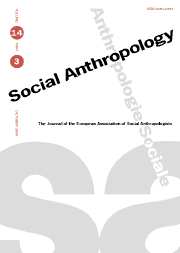Article contents
The vicissitudes of The Gift
Published online by Cambridge University Press: 17 January 2003
Abstract
As of the 1960s, anthropologists from different national traditions have tended to agree upon an interpretation of Marcel Mauss' The Gift. The essay, it is believed, amounts to a theory of exchange whose primary feature is the identification of the gift with the spirit of the donor. This approach, emphasising ‘exchange’ and its ‘spiritual aspects’, is significantly different from the interpretation offered by Mauss' contemporaries, who stressed its references to law, to obligations and to total prestations. Tracing references to The Gift in the work of anthropologists and placing them within a precise chronological order, the paper identifies the moment in which a particular spin has been produced and analyses the social conditions that contributed to the establishment of a doxa in the field. By showing how a particular representation of Mauss' essay became taken for granted, this case-study offers methodological tools to be used in the appraisal of other episodes in the history of social anthropology.
- Type
- Research Article
- Information
- Copyright
- © 2002 European Association of Social Anthropologists
- 1
- Cited by


